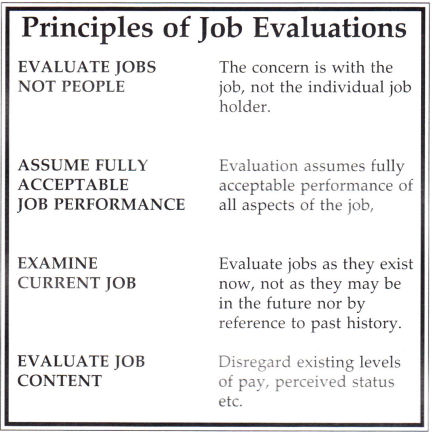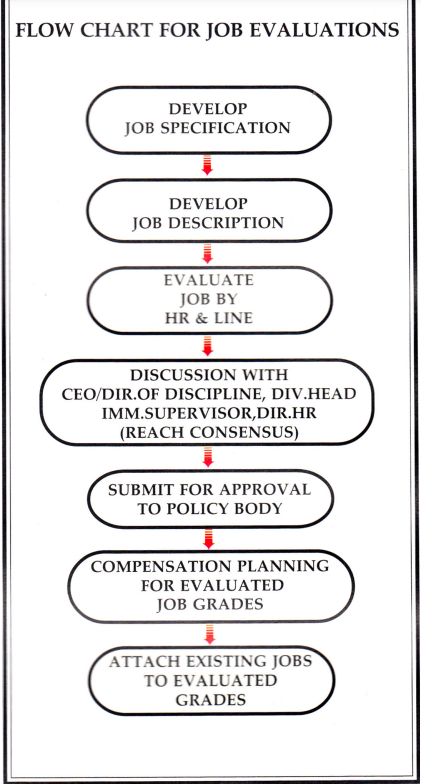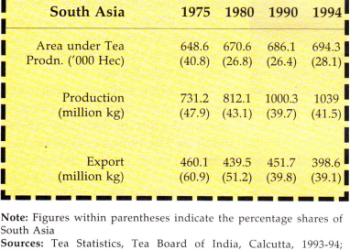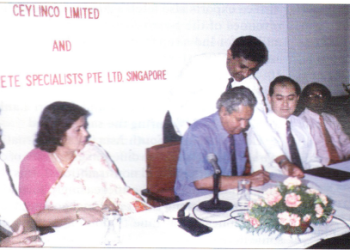Sunil Dissanayake
A basic understanding of the principles of job evaluation and an outline of how the method is used in practice.
Job evaluation is a practical technique designed to enable trained and experienced evaluators to judge the size other. Job evaluation is not scientific, it is judgmental. For job evaluation to work effectively, it is necessary for a group of evaluators to arrive at a common understanding about the job and, through discussion, reach a consensus on the evaluation of that job.
Job evaluation is designed to assist evaluators in arriving at common and consistent judgements about jobs.
There are some essential requirements for the evaluation proeess to work effectively:
Information
The information needed for the evaluation process covers both the job and its organizational context. In order to evaluate at job effectively, evaluators need to have a sound understanding of the job in question. Information on job content is provided by means of a job description, and presented in a common format.
Knowledge and understanding of the organization, how it works, and how the particular job fits into it, is also necessary in order to appreciate fully the relationship of one job to another. Information on this aspect within the job description is supplemented by the experience and expertise of the evaluators themselves and their knowledge of the organization.

A common and agreed understanding of the role and contribution of each job, and how it fits in the organization, is an essential pre requisite before the evaluators can attempt to reach a consensus on their evaluation judgements.
Judgement
Evaluation judgements are made individually by each evaluator initially, and after discussion and debate, a joint view is agreed
upon by the evaluators as a group. This is called a consensus view. Each evaluator makes a series of judgements on the various evaluation factors on the basis of available knowledge and by comparison with the factor evaluations of other jobs. This is not an automatic process applying strict rules, otherwise it would not be necessary to ask experienced people within the company to take part.
These individual judgements are then discussed and debated upon to arrive at a joint view. A thorough exchange of arguments and viewpoints is useful to ensure that the significant facts about. the job are brought out and properly considered. However, it is important to keep in mind that the evaluation process is one of reasoned judgements and not a negotiating forum.
The group of evaluators as a whole has ant accountability to arrive at a reasoned consensus view on the basis of the common understanding of the job content. This is important in order to achieve correct and consistent results and to preserve the integrity of the evaluation process.
Method
Evaluation, as has already been pointed out, is a judgemental process. For the evaluators to make consistent judgements about different jobs, there needs to be a common framework within which they can work.
Judgements are made in terms of three basic factors common to all jobs. Knowhow, problem solving and accountability.
Evaluation Dimensions
Evaluation calls for the exercise of judgment in measuring job content and in perceiving differences between jobs. The evaluation
criteria are common to all jobs, and have over the years been used internationally to evaluate many thousands of directors’ and managers’ roles as well as those of technical, professional, supervisors, junior staff, clerical and retail jobs.
The criteria reflect the way in which effective jobs are constructed in terms of “in- put’ and ‘output.” They on the are based premise that jobs are designed to use knowledge, experience and skills to achieve end results. End results or ‘output’ are expressed by three elements:
Knowhow
Knowhow is the sum of every kind of knowledge, skill and experience required or fully acceptable job performance in terms of depth and range of technical knowhow, breadth of management knowhow and human relations skills.

This covers the input required to achieve the end results. It includes the knowledge, skills and experience required by the job. (whether professional, technical, clerical, skilled or unskilled). The knowledge of the process of direction and management and the skill needed in relation with other people. Knowhow is of value only when put to use to achieve a purpose.
Problem Solving Problem solving is the ‘self staring’ thinking required by the job for analysis, evaluating. creating, reasoning, arriving at and drawing conclusions.
To the extent that thinking is guided by set standards or covered by precedents, or referred to others, problem solving is diminished.
The end results of this element are usually expressed in recommendations, proposals, plans, reports. The element considers the type and degree of thought required by the job, it concerns itself with the extent to which solutions to the problems confronting the job are derived from experience, or demands analytical judgement, it considers the extent to which the definition of the problem or ‘freedom to think’ is circum- scribed.
Accountability
Accountability is the answerability for action and for the consequences of that action. It is the measured effect of the job on results.
This considers the actions available to a job and the end results and consequences of those actions. It looks primarily at the freedom to act and the degree to which the job is constrained by personal or procedural control and guidance. It also considers the general size of the part of the organization on which the job impacts and the nature of that impact.
Sunil Dissanayake is a Human Re sources Management & Development specialist. This article has been developed from his personal experiences in his professional career.




